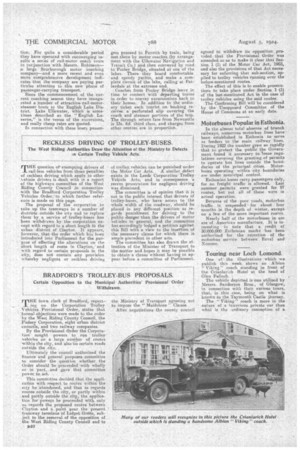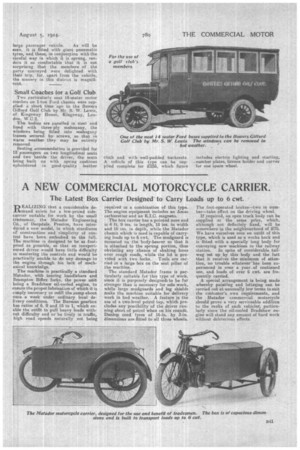BRADFORD'S TROLLEY-BUS PROPOSALS.
Page 22

Page 23

If you've noticed an error in this article please click here to report it so we can fix it.
Certain Opposition to the Municipal Authorities Provisional Order Withdrawn.
THE town clerk of Bradford, reporting on the Corporation Trolley Vehicles Provisional Order, states that 'formal objections were made to the order by the West Riding County Council, the Pudsey Corporation, eight urban district councils, and two railway companies. By the Provisional Order the Corpora. lionsought powers to run trolley vehicles on a large number of routes -within the city, and also 6Ti certain roads outside the city.
Ultimately the council authorized the finance and general purposes committee to consider the question whether the Order should be proceeded with wholly or in part, and gave that committee power to act.
This comniittee decided that the application with respect to routes within the city he abandoned, and that as regards routes outside the city, or partly within and partly outside the city, the application for powers be proceeded with only
as , the proposed routes between Clayton and a point near the present tramway terminus of Lidget Gre-en, subjeet to the removal of the opposition of the West Riding County Council and to
B40 the Ministry of Transport agreeing not to impose the "Maidstone " Clause. After negotiations • the county council agreed to withdraw its opposition provided that the Provisional Order was amended so as to make it clear that Section 1 (1) of the Motor Car Act, 1903, and also the provisions of that Act necessary for enforcing that sub-section, applied to trolley vehicles running over the before-mentioned routes.
The effect of this is to enable prosecutions to take place under Section 1 -(1) of the last-mentioned Act in the case of trolley vehicles using the said routes.
The Confirming Bill will be considered by the Unopposed Committee of the House of Commons at an early date.
Motorbuses Popular in Esthonia.
III the almost total absence of branch railways, numerous motorbus lines have been established in Esthonia to serve as feeders to the maiu railway lines. During 1922 the number grew so rapidly that to protect the public. the Government found it necessary to issue regulations covering the granting of permits to operate bus lines outside the boundaries of the principal cities. Motorbuses operating • within city boundaries are under municipal control.
Esthonian buses carry passengers only, for no freight traffic is allowed. Last summer permits were granted for 97 routes, but not all of these were in actual operation.
Because of the poor roads, motorbus traffic is suspended for about four months in the depth of winter, except on a few of the more important routes.
Nearly half of the motorbuses in use are of American manufacture. It is interesting to note that a credit of 30:000,000 Esthonian marks has been authorized for the retention of the motorbus service between Beval and Nomme.
Touring near Loch Lomond.
One of the illustrations which we publish this week shows an Albion • Viking " coach standing in front of the Crianlarich Hotel at the head of Glen Falloch. • The vehicle depicted is one utilized by Messrs. Sanderson Bros., of Glasgow, in connection With their various tours, that, in this case, being on what is known as the Taymouth Castle jeurney.
The " Viking " coach is more in the nature of a luxurious private car than what is the ordinary conception of a large passenger vehicle. As will be seen, it is fitted with giant pneumatic tyres, and these, in conjunction with the careful way in which it is sprung, ren• dors it so comfortable that it is not surprising that the members of the party conveyed were delighted with their trip, for, apart from the vehicle, the scenery in this district ie magnificent.
Small Coaches for a Golf Club.
Two particularly neat 14-seater motor coaches on 1-ton Ford chassis were supplied a short time ago to the Bowers Gifford Golf Club by Mr. S. W. Lewis, of Kingsway House, Kingsway, London, W.C.2.
The bodies are panelled in steel and lined with three-ply mahogany, the windows being fitted into mahogany frames secured by screws, so that in warm weather they may be entirely removed.
Seating accommodation is provided for 12 passengers on two longitudinal seats and two beside the driver, the seats being built up with spring cushions upholstered in good-quality leather cloth and with well-padded backrests. A vehicle of this type can be supplied complete for £235, which Seers includes electric lighting and starting, -number plates, licence holder and carrier for one spare wheel.






























